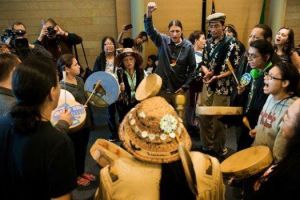On January 15, 2016, the United States Court of Appeals for the Sixth Circuit issued an emphatic victory for the Little River Band of Ottawa Indians (represented by Kanji & Katzen) in a habeas action challenging the Band’s criminal jurisdiction over its members for conduct outside of its Indian country. The petitioner, a Band member and elected official, was convicted in tribal court for a sexual assault committed at a tribal government function on property owned by the Band but not necessarily within the Band’s Indian country. A federal district court granted habeas relief, holding that the Band’s criminal jurisdiction over its members terminated at its Indian country boundaries. In a pathmarking decision, the Sixth Circuit unanimously reversed, holding that “as a historical matter, Indian tribes have the inherent sovereign authority to try and prosecute members on the basis of tribal membership even if criminal conduct occurs beyond a tribe’s Indian country,” and have retained that jurisdiction, at least where the criminal conduct implicates tribal self-government or internal relations.
A full-throated endorsement of tribal sovereignty, the Sixth Circuit’s decision affirms that tribes enjoy membership-based criminal jurisdiction in addition to and independent of their territorial jurisdiction, and that because this jurisdiction has never been divested either implicitly or by Congress, tribes retain it. The Court explained that “Given the baseline assumption that, ‘until Congress acts, the tribes retain their historic sovereign authority,’ we ‘respect [] Congress’s primary role in defining the contours of tribal sovereignty’ and refuse to ‘lightly assume that Congress in fact intends to undermine Indian self-government.’” (quoting Michigan v. Bay Mills Indian Community, 134 S. Ct. 2024 (2014)). The Court also rejected petitioner’s argument that his prosecution by the Band for off-reservation conduct violated due process.
Kelsey v. Pope, No. 14-1537, 2016 WL 51243 (6th Cir. Jan. 5, 2016).
 It is with a mixture of great pride and sadness that the Firm announces that Ethel Branch is leaving to become the eleventh Attorney General of the Navajo Nation. Since joining the Firm in 2012, Ethel has served its clients with great distinction. She has brought her creative legal mind, unwavering attention to detail and stellar work ethic to bear on matters ranging from natural resources protection to the enforcement of gaming compacts. Moreover, in her position as co-chair of the Seattle Human Rights Commission, Ethel was instrumental in the City’s establishment of Indigenous Peoples Day and in the Commission’s decision to call for a boycott of corporate sponsors of the Washington NFL football team, a call the Firm was pleased to heed. Ethel has been a wonderful colleague, and we have all benefited greatly from her intellect, energy, kindness, and humor.
It is with a mixture of great pride and sadness that the Firm announces that Ethel Branch is leaving to become the eleventh Attorney General of the Navajo Nation. Since joining the Firm in 2012, Ethel has served its clients with great distinction. She has brought her creative legal mind, unwavering attention to detail and stellar work ethic to bear on matters ranging from natural resources protection to the enforcement of gaming compacts. Moreover, in her position as co-chair of the Seattle Human Rights Commission, Ethel was instrumental in the City’s establishment of Indigenous Peoples Day and in the Commission’s decision to call for a boycott of corporate sponsors of the Washington NFL football team, a call the Firm was pleased to heed. Ethel has been a wonderful colleague, and we have all benefited greatly from her intellect, energy, kindness, and humor.



